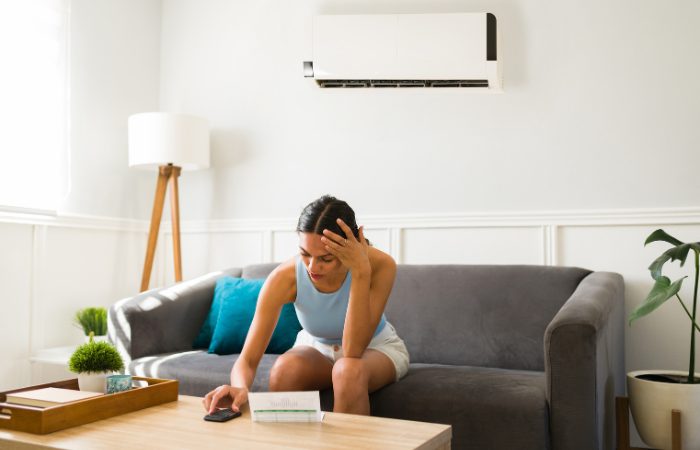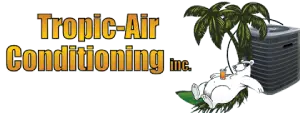In Sarasota, those common HVAC problems can quickly turn from a minor annoyance to a major meltdown, particularly when the summer heat is in full swing. That’s why our trusty air conditioners are practically family members, keeping us cool and comfortable through even the most sweltering days. However, even the most reliable AC units can run into issues. As experienced HVAC professionals in Sarasota, we’ve seen it all. We understand the frustration of a malfunctioning AC, especially when the humidity is through the roof.
That’s why we’re here to share the problems homeowners often encounter and how to address them properly. But before we go into the eight common HVAC problems in Sarasota, we want you to understand why these issues happen in the first place.
Why Do HVAC Problems Happen?
The most common cause of HVAC problems is poor maintenance. Skipping regular HVAC maintenance and neglecting filter changes can lead to a buildup of dirt and grime, clogged components, and decreased efficiency. Over time, this neglect can cause minor issues to escalate into major breakdowns, which leaves you hot and uncomfortable when you need your AC most.
However, you also have to know that, just like any hard-working machine, your HVAC system is prone to wear and tear over time, especially when dealing with Sarasota’s relentless heat and humidity. The constant cycling on and off, combined with dust, debris, and even the occasional critter, can put a strain on your system’s components.
8 Common HVAC Problems Sarasota Homeowners Face
Here in Sarasota, we understand the importance of a well-functioning HVAC system, especially when battling those scorching summer days. But with the constant use and our unique climate, your system can face a number of common issues. Here are the eight common HVAC problems in Sarasota:
1. Refrigerant Leaks
Refrigerant is the chemical that keeps your AC system running and your home cool. If it leaks, your AC won’t be able to do its job properly, which leads to warmer temperatures and potentially higher energy bills as the system strains to compensate. You might hear a hissing or bubbling sound from the unit, notice ice forming on the refrigerant lines, or feel warm air blowing from the vents. Sometimes, a spike in your energy bill is the first sign you notice. If you suspect a leak, it’s important to call a professional HVAC technician promptly. They have the tools and expertise to locate and repair the leak, and then recharge your system with the correct amount of refrigerant.
2. Dirty Air Filters
Dirty air filters are one of the most common HVAC problems out there. Think of your air filter as the lungs of your HVAC system. It’s responsible for trapping dust, pollen, and other particles, making sure that the air circulating in your home is clean and healthy. However, when the filter gets clogged, it restricts airflow, forcing your system to work harder than it should. This can lead to reduced cooling efficiency, higher energy bills, and even premature wear and tear on your system’s components. A dirty filter can also cause warm air to blow from the vents, unusual noises from the system, or a musty smell in your home. The good news is that checking and replacing your air filter is an easy task you can do yourself every 1-3 months, depending on the type of filter and usage.
3. Frozen Evaporator Coils
These coils are located inside your AC unit and play a crucial role in the cooling process. They can freeze up if there isn’t enough refrigerant, if the air filter is dirty, or if there’s a problem with the airflow. When the coils freeze, your AC won’t be able to cool your home effectively, and in some cases, it might stop working altogether. Signs of frozen coils include visible ice buildup on the coils, reduced airflow from the vents, or your AC running constantly without cooling your home. If you suspect your coils are frozen, turn off your AC to allow them to thaw and then call a professional to diagnose and fix the underlying issue.
4. Faulty Thermostat
Your thermostat is essentially the control center for your HVAC system, telling it when to turn on and off and what temperature to maintain. If it’s not working correctly, it can wreak havoc on your home’s comfort level. You might notice inaccurate temperature readings on the thermostat display, your AC not turning on or off when it should, or uneven temperatures in different rooms. If you have a battery-powered thermostat, try replacing the batteries first. If that doesn’t solve the problem, you might need to replace the thermostat entirely.
5. Electrical Issues
Electrical issues are common HVAC problems homeowners encounter. Your HVAC system relies on electricity to function, and problems with the wiring, fuses, or circuit breakers can disrupt its operation. If your AC won’t turn on at all or it keeps tripping the circuit breaker, there’s likely an electrical issue at play. Don’t try to troubleshoot electrical problems yourself – it’s best to call a qualified electrician to check and fix the issue safely.
6. Dirty Condenser Coils
The condenser coils are located in the outdoor unit of your AC unit and play a very important role in releasing heat. When these coils become dirty, usually due to dust, dirt, leaves, or other debris, they can’t release heat efficiently. This can lead to reduced cooling performance, higher energy bills as your system works harder to compensate, and a noisy outdoor unit. You can try cleaning the coils yourself with a hose or soft brush, but it’s often best to call a professional for a thorough cleaning, especially if the coils are heavily soiled.
7. Blower Motor Issues
The blower motor is the heart of your HVAC system, responsible for circulating the air throughout your home. If the motor isn’t working correctly, you won’t feel much airflow coming from the vents. You might also hear strange noises from the motor or notice that your AC is running but not producing any cool air. In some cases, a simple fix like a loose belt might solve the problem, but more often than not, blower motor issues require professional repair or replacement.
8. Ductwork Leaks
The ductwork in your home is a network of ducts that carry the cooled air from your AC unit to the different rooms. If there are leaks in the ductwork, that precious cool air can escape before it reaches its intended destination. This leads to uneven temperatures in different rooms, higher energy bills as your system works overtime, and even the circulation of dust and allergens throughout your home. If you suspect ductwork leaks, it’s crucial to have a professional inspect and seal them.
Frequently Asked Questions
Can I prevent frozen evaporator coils by simply changing the air filter regularly?
While a clean air filter is crucial for proper airflow and can help prevent frozen coils, it’s not the only factor. Low refrigerant levels due to leaks can also cause this issue. If you notice ice on your coils, it’s important to call a professional to diagnose the root cause and fix it.
My AC is making a clicking sound when it starts up. Should I be worried?
Clicking sounds can be normal during startup or shutdown, but if the clicking is persistent or accompanied by other unusual noises, it could indicate a problem with the electrical contacts or the motor. It’s best to have a technician assess the situation to prevent further damage.
Is it safe to clean the condenser coils myself?
Yes, you can gently clean the condenser coils with a hose or soft brush, but be careful not to bend the fins. However, if the coils are heavily soiled or you’re unsure of the proper cleaning technique, it’s best to have a professional do it to avoid damaging the unit.
How can I tell if my ductwork has leaks?
Signs of ductwork leaks include uneven temperatures in different rooms, higher energy bills, and musty odors coming from the vents. To confirm leaks, a professional can perform a duct leakage test.
Keep Your HVAC Running Optimally Year-Round with Tropic Air Conditioning
The best way to avoid unexpected HVAC breakdowns is with regular maintenance. Tropic Air Conditioning offers comprehensive maintenance services to keep your system running efficiently and catch potential problems early. Don’t wait for a sweltering summer day to discover your AC isn’t working. Contact us today to learn more about our HVAC maintenance services and schedule your next tune-up.




